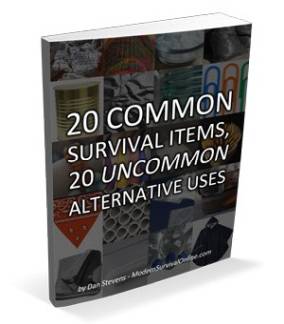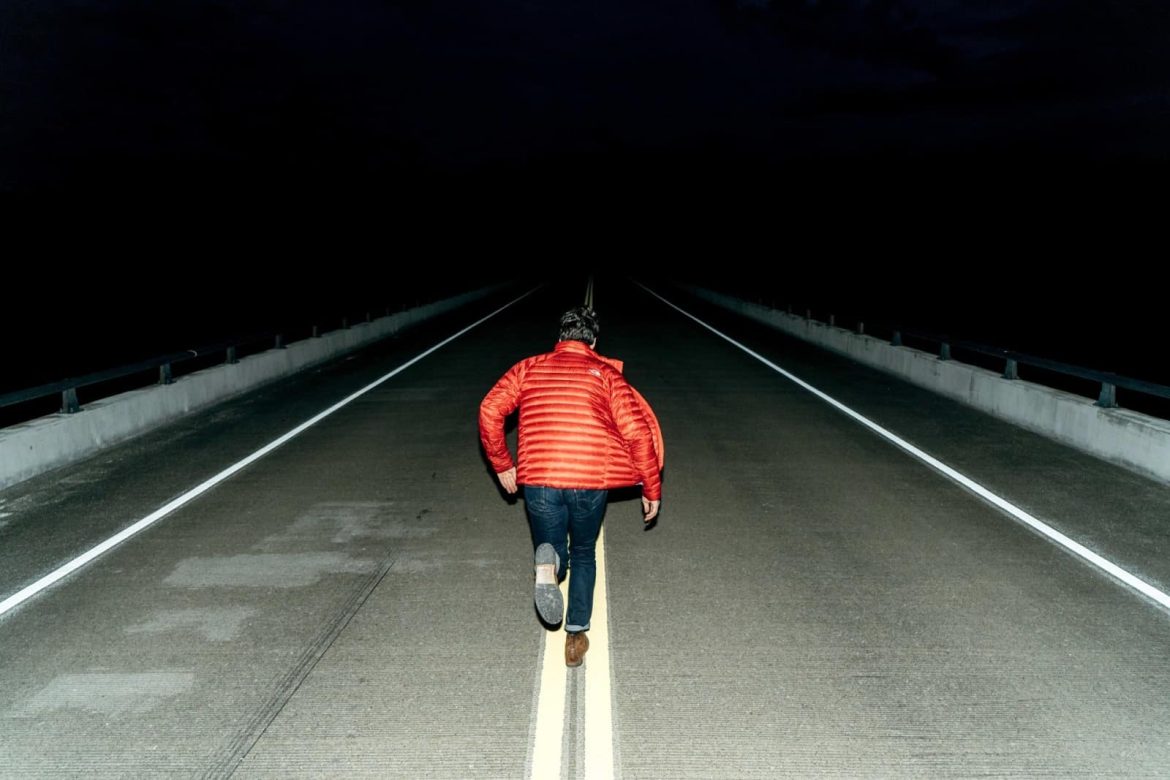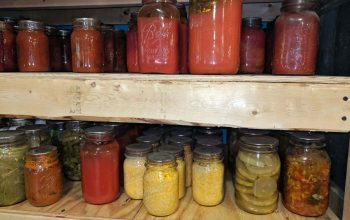All of us know that disasters great and small are dangerous. You don’t really prepare for things on this scale if they aren’t truly so… Natural or man-made makes no difference; any given event will carry with it dozens of ways to die.
And so we prepare. We train. We plan. We stockpile. All in the hopes that when the reaper comes around we can say “not today” and slam the door in his face. That’s the way these things go. Right? Right…
Or is it? Is anything ever guaranteed in life? Is our survival assured at any cost? How about the lives of our loved ones?
For even the most skilled and confident will have doubts. Small ones, grim ones, in the dark recesses of their mind. “What if I don’t make it? What if it isn’t enough? What if I am unlucky? Too slow? Too late?”
Fair questions, all. Hard to ponder. Terrible to consider. But understanding risk and facing fear head on is something all preppers must be able to do.
In this article, I’ll take a break from my usual instructive and skill building content to discuss the darker side of disaster. The side where, perhaps, your number comes up…
What Are The Odds?
If only I could answer that question, I would not only be a wealthy, wealthy man but would also surely forestall my own death.
The variables present in any disaster, especially a severe one, are so numerous, so mutable and produce so many cascading second and third order effects there is no way to calculate them.
Consider also how much influence you have over the event, and your response. Your training, plan and material preparations could certainly influence the outcome.
Broadly speaking, we know that unless something comes along and kills you outright, if you are prepared with the right knowledge, skills and equipment your chances of surviving most disasters are pretty good.
Consider your average tornado; a storm of such power it can wipe entire towns right off the map, leaving tattered remnants of civilization in its wake…
Even in very severe instances, deaths from tornadoes are rare. Surprising considering the sheer violence of the event. It goes to show a little preparation (shelter), early warning and acting before things get bad will see most people survive its passage with nary a scratch.
Deaths typically result from those caught in the open, exposed to airborne missiles or have no choice but to shelter in flimsy structures.
Your chances of survival in other events may not be so good. Plagues and pestilence are two classical disasters that can sow death far and wide before you have a chance to react and medical countermeasures can catch up.
How can you protect yourself against something before you know it has arrived?
The bottom line certain types of disasters will have a greater chance of killing you outright versus others. These usually inflict casualties in a “burst” of carnage. Some are slower acting, but no less lethal, and will kill the unwary, lazy or foolhardy should they remain in the area of affect.
Any regional or national-scale disaster may damage the infrastructure of society badly enough that death from follow-on effects or living in the aftermath is a real possibility.
I’ll talk about a few scenarios below that fall in either category as well as mishaps, misadventures or plain old bad luck that could lead to your untimely fate.
And Just Like That…
Some threats will arrive with little or no warning, and be so dangerous that anything short of immediate action may see you killed.
Events like these are likely to place you into the “wrong place, wrong time” category of death. Think high lethality, little or no time to react and rapid onset. Potentially these events may have a wide area of effect.
Disasters in this category are things like a nuclear detonation, large asteroid or meteor impact, quickly forming severe weather (blizzard, tornado, strong thunderstorm), car wrecks, flash flooding, landslides, major earthquakes, plane crashes and so forth.
Quieter but no less lethal instances could be certain chemical and biological agents released over a wide area discreetly affecting a large number of people and leaving no time to react before symptoms set in.
The basis is, if you are unlucky enough to be in “ground zero” when one of these events occurs, you’ll need serious luck on your side to survive. That’s the brakes. It happens to people every day, hapless bystander and hardened prepper alike.
- Slower, But Still Deadly
Some disasters are either predictable, to a certain degree, building or moving slowly enough they afford you the time to formulate a response or implement you escape and survival plan.
Make no mistake, many disasters of this kind are still highly lethal, and not to be trifled with. One insidious element they sometimes manifest is instilling a “wait and see” mentality in some.
“Maybe it will stop. Maybe it will go around. Maybe…”
Disasters in this category include hurricanes, wildfires, conventional flooding and simmering social unrest prior to it erupting into full-blown rioting and Hell-raising.
Note that all of them give ample warning as to their approach. None of them erupt onto the scene out of nowhere. The wise will go while the going is good… if they have a choice. The brave or foolish will linger hoping to ride out the worst of it.
These events are typically survivable, no matter how severe they are, because you have time and opportunity to react and get away from danger!
Nonetheless, you will always see reports of deaths resulting from these and other similar events because someone who could have gotten out of the way chose to stay.
Perhaps it was simply a bad judgment call. Perhaps it was pride. It won’t matter when you are dead. Fires shift. Hurricanes intensify. Mass demonstrations turn violent and badly. Don’t be lulled into a false sense of safety because it hasn’t “turned” yet.
Mishaps, Misadventure, and Accident
Death may find you through far less exciting channels. Life expectancy in the modern world is so long only due to the prevalence and abundance of so much we take for granted:
Regular and emergency medical care, plentiful food and clean water, efficient and expert emergency services and miraculous technological solutions to problems our ancestors spent their lifetimes attempting to master.
When reacting to a disaster, you might find yourself in a situation that any other time would be an inconvenience or merely scary when you can summon aid with the press of a button.
In a time of uncertainty, fear, and chaos, even once minor problems may take on life-threatening, even deadly significance.
Consider what you would do if you were bugging out on foot through a remote area. Just you and your BOB. You pushed yourself a little hard and, with day turning to dusk, slip, stumble and badly break an ankle. If this were a pleasure hike, someone may eventually find you, or come looking for you.
Considering you are fleeing a situation on unbridled chaos, with power out and cell phone networks down, you will certainly not be able to count on that, and will be unable to call for help.
Stranded, basically immobilized and exposed to the elements, sheltering yourself will take on agonizing, life-and-death importance. Your food and water supply are both limited, and gathering more may be impossible. What will you do now? There have been tougher, better men die in lesser circumstances.
Alternately, lethal misfortune may arrive in the form of simple accident: a cut or gash becomes badly infected. Some of your food went bad and you contract botulism or dysentery.
You wind up catching a bullet in the brain from a gunfight occurring 5 blocks away. Falling debris impales or flattens you. You are struck and killed by a panicked motorist. What a way to go; you survive The Big One only to meet your end from so small a thing.
No prepper worth their salt imagines it will happen to them, but history has furnished us with plenty of examples t the contrary.
Old Age and Infirmity
It is a cruel truism and nature that the very old or infirm suffer the most when disaster strikes. Survival situations exact a terrible toll on brain and body, a toll that the elderly may not be able to bear in any case, but will probably not be able to bear at all on their own.
Injury, illness and exposure hit the very old far harder than the rest of us. A common bug that would only hamper or sicken a healthy adult in their prime or middle age will decimate a senior citizen, perhaps even kill them.
The same goes true for wounds; an aging, failing body will not sustain as much damage as a younger one.
No matter how motivated you might be, or how well prepared, if you are a prepper at or past your Golden Years you may be confronted with a situation you cannot hope to negotiate without aid. No force of will can overcome a failing body.
- Taking Your Chances
Ultimately, a certain amount of risk and uncertainty will always remain when you are coping with a disaster.
Anything you do may get you killed, including doing nothing. Hindsight is, well, you know. The best you can do is manage what risks you can, and take steps to guard yourself against preventable death and threats.
If you have been prepping any length of time, you have likely already accomplished that. So much loss of life can be avoided with just a little preparation.
If you are truly well prepared with a stash of food, water, shelter items, tools and the grit and know-how to make use of all of it in a rough spot, you’ll have done much to mitigate risk to life, and hopefully, barring plain bad luck, you won’t wind up like those staring and lost souls clinging to the ragged edge of life wondering how all this happened.
Even so you’ll take risks. Some will be big. Others will be small. If you have prepared accordingly you don’t need to worry about the small ones very much. The big risks will be worth careful consideration, as no amount of preparation may prevent tragedy should you roll snake-eyes.
The decision to shelter in place or bug-out. Fight or flee. Help a stranger or take no chances. Who to trust. Things like that.
Some will be so big, your one-in-a-million chances, that there is not much you can truly do to defend against them at all.
Long-Term Concerns
After the smoke has cleared and the rubble has settled in the aftermath of a serious catastrophe, society may be fundamentally changed, along with all the things we depend on and take for granted in everyday life. Food, medicine, clean water, power, and more may be disrupted, intermittent or absent entirely.
Depending on the severity of the situation, your long term plan and assets, you may be living only as long as your supplies last. Lack of food, water or fuel may doom you.
Without the wheels of commerce to supply what we need, you’ll be relying on what you can scavenge, barter, grow, hunt, gather, harvest or make. Sustainment living, homesteading, whatever you want to call it, is doable but very hard work, and requires considerable skill.
Without the skill and the land, you’ll be alive as long as your supplies hold, and not much longer thereafter.
Fear and Faith
Dealing with fear and accepting the things you cannot change or influence will require a certain amount of faith. Believers will draw strength and confidence from God. Anyone can draw confidence from the amount of work, blood, sweat and tears they put in to prepare for this fateful day.
Believe in your own strength and skill. Have faith in yourself: you are skilled enough, smart enough and strong enough to not only survive but thrive in such terrible circumstances.
Visualize a positive outcome, with you and yours safe and sound. Race car drivers will tell you that you steer where you are looking, so you don’t look at what you don’t want to crash into. You can do the same thing mentally.
Don’t focus down on the things you don’t want to see happen. This will only serve to cloud your thinking and magnify fear and dread. Only focus on the things you can do to improve your situation now. If there is, very literally, nothing you can do, don’t spare it a molecule of worry.
Conclusion
Death will lurk around every corner when the SHTF, waiting for the slightest lapse in concentration, judgment, or focus. While there is much your work and preparation to this point will do to ward off risk to life and limb, you simply won’t be able to eliminate risk completely.
Understand this and get over it so your mind is not clouded by uncertainty and doubt when you need to be sharp and task-oriented when under stress.


Like what you read?
Then you’re gonna love my free PDF, 20 common survival items, 20 uncommon survival uses for each. That’s 400 total uses for these dirt-cheap little items!
We will not spam you.



